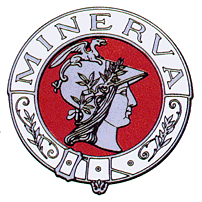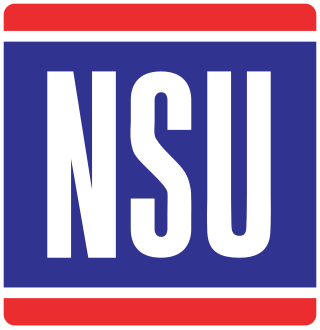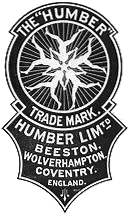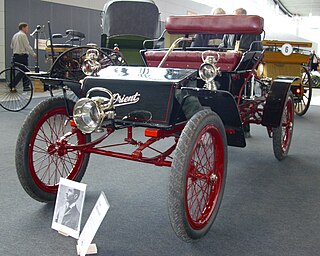
Minerva was a Belgian firm active from 1902 to 1938 and a manufacturer of luxury automobiles. The company became defunct in 1956.

NSU Motorenwerke AG, or NSU, was a German manufacturer of automobiles, motorcycles and pedal cycles, founded in 1873. Acquired by Volkswagen Group in 1969, VW merged NSU with Auto Union, creating Audi NSU Auto Union AG, ultimately Audi. The name NSU originated as an abbreviation of "Neckarsulm", the city where NSU was located.

Alldays & Onions was an English engineering business and an early automobile manufacturer based at Great Western Works and Matchless Works, Small Heath, Birmingham. It manufactured cars from 1898 to 1918. The cars were sold under the Alldays & Onions name. Alldays also built an early British built tractor, the Alldays General Purpose Tractor. After the First World War the cars were sold under the name Enfield Alldays. Car production seems to have ceased in the 1920s but the manufacture of many other items continued. The company became part of the Mitchell Cotts Group.

L'Aster, Aster, Ateliers de Construction Mecanique l'Aster, was a French manufacturer of automobiles and the leading supplier of engines to other manufacturers from the late 1890s until circa 1910/12. Although primarily known as an engine mass manufacturer the company also produced chassis for coach-works and a complete range of components.

Sunbeam Motor Car Company Limited was a British automobile manufacturer in operation between 1905 and 1934. Its works were at Moorfields in Blakenhall, a suburb of Wolverhampton in Staffordshire, now West Midlands. The Sunbeam name had originally been registered by John Marston in 1888 for his bicycle manufacturing business. Sunbeam motor car manufacture began in 1901. The motor business was sold to a newly incorporated Sunbeam Motor Car Company Limited in 1905 to separate it from Marston's pedal bicycle business; Sunbeam motorcycles were not made until 1912.

Singer Motors Limited was a British motor vehicle manufacturing business, originally a bicycle manufacturer founded as Singer & Co by George Singer, in 1874 in Coventry, England. Singer & Co's bicycle manufacture continued. From 1901 George Singer's Singer Motor Co made cars and commercial vehicles.

Humber Limited was a British manufacturer of bicycles, motorcycles, and cars incorporated and listed on the stock exchange in 1887. It took the name "Humber & Co Limited" because of the high reputation of the products of one of the constituent businesses that had belonged to Thomas Humber. A financial reconstruction in 1899 transferred its business to Humber Limited.

Lea-Francis was a British motor manufacturing company that began by building bicycles.

Wolseley Motors Limited was a British motor vehicle manufacturer founded in early 1901 by the Vickers Armaments in conjunction with Herbert Austin. It initially made a full range, topped by large luxury cars, and dominated the market in the Edwardian era. The Vickers brothers died and, without their guidance, Wolseley expanded rapidly after the war, manufacturing 12,000 cars in 1921, and remained the biggest motor manufacturer in Britain.

Waltham Manufacturing Company (WMC) was a manufacturer of bicycles, motorcycles, motorized tricycles and quadricycles, buckboards, and automobiles in Waltham, Massachusetts. It sold products under the brand names Orient, Waltham, and Waltham-Orient. The company was founded in 1893, moving to self-propelled vehicles after 1898.

E. R. Thomas Motor Company was a manufacturer of motorized bicycles, motorized tricycles, motorcycles, and automobiles in Buffalo, New York between 1900 and 1919.

The Vulcan Motor and Engineering Company Limited, of Southport, England, made cars from 1902 until 1928 and commercial vehicles from 1914 until 1953.
The Calthorpe Motor Company based in Bordesley Green, Birmingham, England, made a range of cars, motorcycles and bicycles from 1904 to 1932.
This timeline of motorized bicycle history is a summary of the major events in the development and use of motorized bicycles and tricycles, which are defined as pedal cycles with motor assistance but which can be powered by pedals alone.

Douglas was a British motorcycle manufacturer from 1907 to 1957 based in Kingswood, Bristol, owned by the Douglas family, and especially known for its horizontally opposed twin cylinder engined bikes and as manufacturers of speedway machines. The company also built a range of cars between 1913 and 1922.
The history of the motorcycle begins in the second half of the 19th century. Motorcycles are descended from the "safety bicycle," a bicycle with front and rear wheels of the same size and a pedal crank mechanism to drive the rear wheel. Despite some early landmarks in its development, the motorcycle lacks a rigid pedigree that can be traced back to a single idea or machine. Instead, the idea seems to have occurred to numerous engineers and inventors around Europe at around the same time.

The Gladiator Cycle Company, Clément-Gladiator, was a French manufacturer of bicycles, motorcycles and cars based in Le Pré-Saint-Gervais, Seine.

Fafnir was a German engine and vehicle manufacturer based in Aachen (Prussia). They made a range of cars between 1908 and 1926.

Mitchell was a major brass-era automobile marque in Racine, Wisconsin, from 1903 to 1923.

Dennis Brothers Limited was an English manufacturer of commercial vehicles based in Guildford. It is best remembered as a manufacturer of buses, fire engines and lorries (trucks) and municipal vehicles such as dustcarts. All vehicles were made to order to the customer's requirements and more strongly built than mass production equivalents. Dennis Brothers was Guildford's main employer.

















